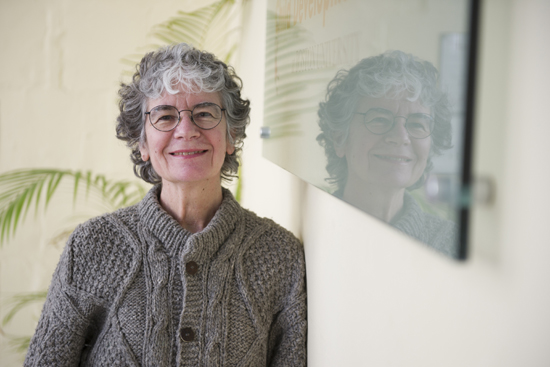BU Research: A Riddle Reveals Depth of Gender Bias
What's your answer to this question?

Deborah Belle, a CAS psychology professor, helped with research showing the staying power of gender stereotypes. Photo by Cydney Scott
Here’s an old riddle. If you haven’t heard it, give yourself time to answer before reading past this paragraph: a father and son are in a horrible car crash that kills the dad. The son is rushed to the hospital; just as he’s about to go under the knife, the surgeon says, “I can’t operate—that boy is my son!” Explain. (Cue the final Jeopardy! music.)
If you guessed that the surgeon is the boy’s gay, second father, you get a point for enlightenment, at least outside the Bible Belt. But did you also guess the surgeon could be the boy’s mother? If not, you’re part of a surprising majority.
In research conducted by Mikaela Wapman (CAS’14) and Deborah Belle, a College of Arts & Sciences psychology professor, even young people and self-described feminists tended to overlook the possibility that the surgeon in the riddle was a she. The researchers ran the riddle by two groups: 197 BU psychology students and 103 children, ages 7 to 17, from Brookline summer camps. (They did the latter study through the Undergraduate Research Opportunities Program (UROP).)
In both groups, only a small minority of subjects—15 percent of the children and 14 percent of the BU students—came up with the mom’s-the-surgeon answer. Curiously, life experiences that might suggest the mom answer “had no association with how one performed on the riddle,” Wapman says. For example, the BU student cohort, where women outnumbered men two-to-one, typically had mothers who were employed or were doctors—“and yet they had so much difficulty with this riddle,” says Belle. Self-described feminists did better, she says, but even so, 78 percent did not say the surgeon was the mother. (The results were no different for an alternate version of the riddle: a mother is killed, her daughter sent to the hospital, and a nurse declines to attend to the patient because “that girl is my daughter”; few people guessed that the nurse might be the child’s father.)
The genesis of the research was Belle’s 10-year-old granddaughter, who was given the riddle by her mom. “She thought for a moment,” Belle says, “and she said, ‘How could this be? Well, he could have two fathers.’” The child couldn’t muster any other explanation. Nor could several of her friends. “This piqued our interest,” Belle says. When she and Wapman posed the riddle to kids in the UROP study, some of the answers stretched the bounds of inventiveness: the surgeon was a robot, or a ghost, or “the dad laid down and officials thought he was dead, but he was alive.”
The results are all the more surprising considering that college students and participants in tony Brookline’s summer programs likely hail from higher income and educational backgrounds than the general population. “These are two populations that we would expect, if anything, would be in the avant-garde,” Belle says. Yet, for example, BU students theorized the “father” in the car referred to a priest, or the surgeon was “horribly confused,” or, à la the old Dallas TV show, the whole scenario was a dream.
What made imagining a surgeon mom so difficult? Gender schemas—generalizations that help us explain our complex world and “don’t reflect personal values or life experience,” says Wapman. (So having a surgeon mother doesn’t necessarily mean you’ll propose that as the riddle’s solution.) “Schemas are very, very powerful,” Belle says, adding that the studies’ results and the endurance of gender stereotypes would not surprise Virginia Valian, a Hunter College psychologist who has noted how people presented with the same CV for a man and a woman typically assume the man is more competent.
Valian “argues that schemas are formed very early in life,” says Belle, “and that when it comes to gender, we fixate on women’s reproductive functioning, and we sort of allot competence to men. Experience can have some effect in our schemas, but much less than we might anticipate.” Valian has also noted that schemas are identical in our culture for men and for women—which is exactly what the BU survey found.
That bias against women, Wapman believes, shows the significance of schemas, “this silly riddle” notwithstanding. Stephanie Coontz, who teaches history and family studies at Evergreen State College in Washington state, cited the BU duo’s work in a New York Times column on the problems facing mothers in the workplace.
The solution? “Having people understand that they hold this bias,” says Wapman, “and when you look at job applicants, keep that in mind.”
“Eternal vigilance, I think, is the only solution,” says Belle. “These schemas do change over time”—she points to other countries with greater gender equity—“but the pace is glacial.”

Comments & Discussion
Boston University moderates comments to facilitate an informed, substantive, civil conversation. Abusive, profane, self-promotional, misleading, incoherent or off-topic comments will be rejected. Moderators are staffed during regular business hours (EST) and can only accept comments written in English. Statistics or facts must include a citation or a link to the citation.